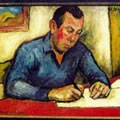Writing East of Eden

John Steinbeck started this book thinking about families. His original intention was to write the book itself on the right page, and a letter to his two young sons from a previous marriage, ages four and six, on the left. Young Tom and John were, initially, his audience. Loving them deeply, cut off from daily contact, worried about the influence their mother Gwyn—who drank heavily—had on both, he reached out in the way he knew best: through writing. "But [I] try to relate the reader to the book," he writes in his journal, "so that, while I am talking to the boys actually, I am relating every reader to the story as though he were reading about his own background. ... Everyone wants to have a family. Maybe I can create a universal family living next to a universal neighbor." That statement, written on his first work day, captures his dual intention in the novel: to write intimately and universally; about self and about all selves; about his family history for his boys and about a mythic, symbolic history that would, in the future, have meaning for them and significance for all.
Participatory Prose
Often when he wrote novels, Steinbeck addressed a friend, establishing an intimacy for his prose as he composed. The sense of empathy and compassion that so many readers recognize in his writing is also a result of his efforts to connect with an audience. "That is what I am trying to do with this whole book," he wrote two months after beginning his writing, "to keep in an extremely low pitch and to let the reader furnish the emotion." Steinbeck wrote first for his sons, later directly to his editor Pascal Covici (Journal of a Novel is the diary he kept, addressed to Covici), but he always considered how to engage a reader, to situate the reader in his text. His was participatory prose. In East of Eden, he wants the issues of family and place, so intimately his, to be achingly true for others. "My wish is that when my reader has finished with this book, he will have a sense of belonging in it. He will actually be a native of that Valley."
Participatory Prose
Often when he wrote novels, Steinbeck addressed a friend, establishing an intimacy for his prose as he composed. The sense of empathy and compassion that so many readers recognize in his writing is also a result of his efforts to connect with an audience. "That is what I am trying to do with this whole book," he wrote two months after beginning his writing, "to keep in an extremely low pitch and to let the reader furnish the emotion." Steinbeck wrote first for his sons, later directly to his editor Pascal Covici (Journal of a Novel is the diary he kept, addressed to Covici), but he always considered how to engage a reader, to situate the reader in his text. His was participatory prose. In East of Eden, he wants the issues of family and place, so intimately his, to be achingly true for others. "My wish is that when my reader has finished with this book, he will have a sense of belonging in it. He will actually be a native of that Valley."



